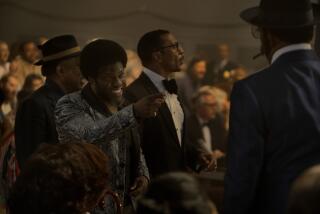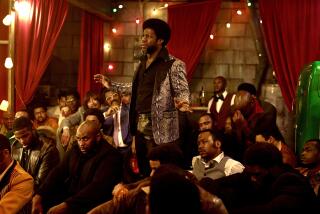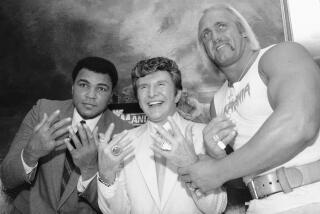Muhammad Ali and Howard Cosell were must-see sports TV
- Share via
In 1974, Muhammad Ali appeared on ABC’s “Wide World of Sports” with Joe Frazier to talk with Howard Cosell about their upcoming heavyweight title rematch. Ali’s frequent taunting prompted Frazier to lunge at him and the two boxers wrestled on the floor until being separated by their entourage members.
Cosell dispassionately described the scuffle without moving from his chair on the set.
“If either one of them wanted to throw a punch at one another, Howard wasn’t going to stop it,” said Don Ohlmeyer, who was in the studio that day. “As I recall it was a lot of pushing and shoving and hugging and rolling.”
By that time, viewers had come to expect fireworks when Ali and Cosell were on the screen together. It was one of TV’s great yet odd pairings: two men with distinctly different backgrounds who shared the ability to polarize and captivate the public. Ali died Friday at the age of 74; Cosell died in 1995.
“Howard and Ali had this incredible rapport and they both understood the importance that each other could play in their respective careers,” recalled Ohlmeyer, a veteran TV executive who was a young producer at ABC Sports in the 1970s. “And they also legitimately liked each other. They were great fun to be around because it was very unpredictable as to what would happen, such as Ali threatening to take Howard’s hairpiece off. They were very funny together and they also created their own news. “
Cosell had been covering boxing mostly on the radio for ABC in the early 1960s after a career as a lawyer. With a honking nasal voice and an appearance more suitable for carrying legal briefs than looking into a camera, he was never pegged as a future network TV star. But his career took off once Ali, still known as Cassius Clay, became a global TV personality that transcended the ring on the night of Feb. 24, 1964.
That was when Ali shocked experts with his victory over heavyweight champion Sonny Liston to win his first title. Cosell famously asked an exuberant Ali (“I am the greatest! I have upset the world!”) to “let go of the mic” at the end of their post-fight interview in the ring.
From that moment on, a bantering Cosell and Ali were a familiar scene on ABC before and after every fight, as well as during the legal battle that stripped Ali of his title. They both could be brash and cocky, making them controversial at a time when most star athletes were publicly modest and sportscasters were affable but often dull.
“Ali was the first athlete in the television age to announce his own greatness, Cosell was the first broadcaster,” is how Dave Kindred described their connection in his 2007 book about the two men, “Sound and Fury.”
The chatter between Ali and Cosell was often more entertaining than the fights they preceded. Before Ali’s Nov. 1965 title defense, he asked the champ about challenger Floyd Patterson, a popular, soft-spoken African American fighter who was past his prime.
“Privately you’ve confided that Patterson has been ‘the white hope’ to this country,” Cosell asked. “Do you believe that?”
“That’s right,” said Ali. “He’s the Technicolor white hope.”
Cosell recognized Ali’s personality and provided the fighter with a platform to promote his beliefs, basking in the attention they generated. But Ali also appreciated having someone who presented his views without judgment when covering the fighter’s ties to the Nation of Islam and his refusal to be inducted into the Armed Forces during the Vietnam War.
Cosell was among the first high-profile white journalists to abandon the term “also known as Cassius Clay” when interviewing the champion, giving Ali the respect not afforded by other news organizations.
In the years after that controversy, viewers tuned in for the repartee. ABC Sports executive Roone Arledge wanted his upstart division to have a more contemporary approach in its coverage and made the propulsive combination of Ali and Cosell a signature attraction on “Wide World of Sports.”
“Ali was by nature a playful personality,” said Ohlmeyer. “I think there was a natural symbiotic relationship. Howard was at a point in his career when he was ready to play too. I wouldn’t call them intimate friends but I know they appreciated each other.”
Ohlmeyer, like many who knew Ali during his vibrant years as champion, gets emotional when recalling the fighter’s seemingly rapid decline after retirement. The executive remembers spending time with Ali in an airport lounge a few years after the fighter was diagnosed with Parkinson’s disease in the early 1980s.
“It was one of the saddest moments of my life,” said Ohlmeyer. “We had chatted for a while – it was remarkable at how different and withdrawn he had become. Then I saw him sitting on the floor with some kids and he was doing magic tricks with them. It was so sad to see somebody so vibrant get to that point. He was already a shadow over the old Ali. He was one of the most electric people to be around. He was always full of life. It seemed like it had started to drain.”
More to Read
The complete guide to home viewing
Get Screen Gab for everything about the TV shows and streaming movies everyone’s talking about.
You may occasionally receive promotional content from the Los Angeles Times.







